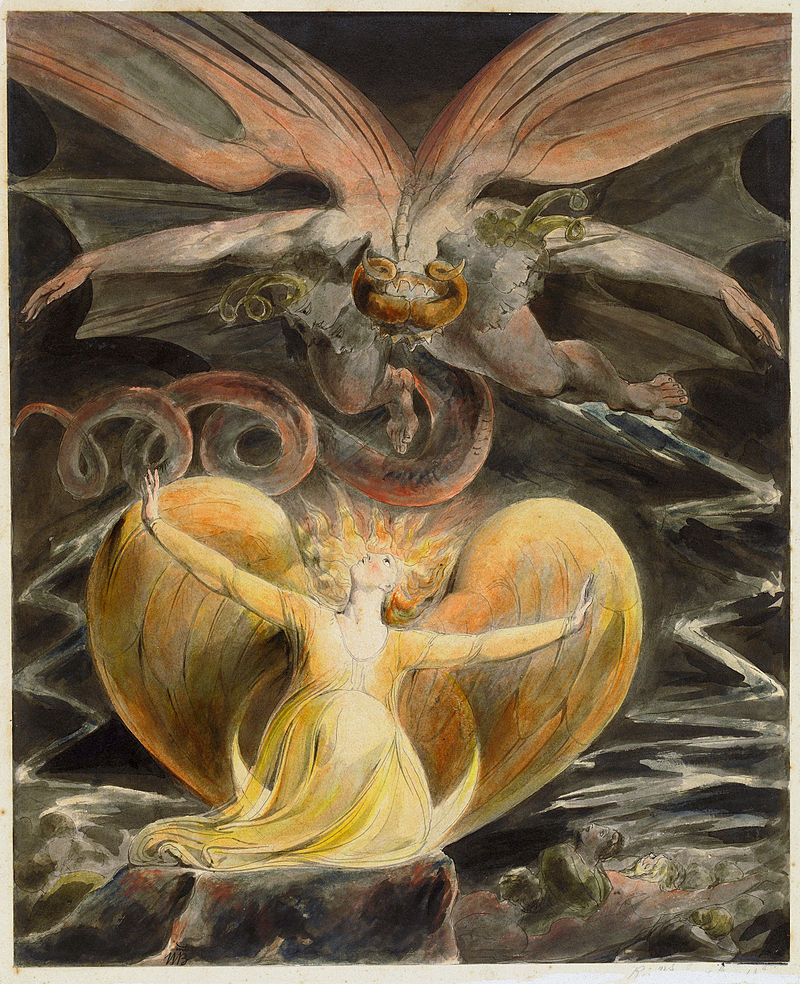Book of Urizen, Plate 6
The aspect of the psyche which is hidden, buried and unknown is spoken of as the unconscious. It is unknown but not unknowable. Although the gate is closed to enter the unconscious; the gate for unconscious content to come out is not entirely closed. Much of what Blake has written about in his poetry has come from his unconscious.
One of the Four Zoas is mentioned less frequently than the others - Urthona - and when he is mentioned his name is frequently prefixed by the word dark. He has a manifestation in the outer world who is named Los, but as an Eternal he seems to play a lessor role. He is dark for Blake because he is in the unconscious. As he enters consciousness his forms and activities become a part of the world of consciousness.
Jung called Reason and Feeling the rational functions; Sensation and Intuition were called irrational. Blake has Tharmas and Urthona working together to repel the advances of Urizen into Urthona's territory. I have spoken of Tharmas (Blake's image for the physical body or senses) functioning as the Id, Urthona can be seen as functioning as the Intuition. Both reside in man's unconscious.
Here is an account of Urizen's attempt to invade the territory of Urthona, Four Zoas :
Night VI, Page 74, (E 350):
"And now he came into the Abhorred world of Dark Urthona
By Providence divine conducted not bent from his own will
Lest death Eternal should be the result for the Will cannot be
violated
Into the doleful vales where no tree grew nor river flowd
Nor man nor beast nor creeping thing nor sun nor cloud nor star
Still he with his globe of fire immense in his venturous hand
Bore on thro the Affrighted vales ascending & descending
Oerwearied or in cumbrous flight he venturd oer dark rifts
Or down dark precipices or climbd with pain and labour huge
Till he beheld the world of Los from the Peaked rock of Urthona
And heard the howling of red Orc distincter & distincter"
Urizen fails to occupy Urthona's territory. Later near the end of the Four Zoas, Urthona resumes his work which had been interrupted as he fell from Eternity with Urizen and Luvah. The association between Urthona and Tharmas continues.
___________
Four Zoas: Night IX, PAGE 138 (E 405)
"Then Dark Urthona took the Corn out of the Stores of Urizen'
He ground it in his rumbling Mills Terrible the distress
Of all the Nations of Earth ground in the Mills of Urthona
In his hand Tharmas takes the Storms. he turns the whirlwind
Loose
Upon the wheels the stormy seas howl at his dread command
And Eddying fierce rejoice in the fierce agitation of the wheels
Of Dark Urthona Thunders Earthquakes Fires Water floods
Rejoice to one another loud their voices shake the Abyss
Their dread forms tending the dire mills The grey hoar frost
was there
And his pale wife the aged Snow they watch over the fires
They build the Ovens of Urthona Nature in darkness groans
And Men are bound to sullen contemplations in the night
Restless they turn on beds of sorrow. in their inmost brain
Feeling the crushing Wheels they rise they write the bitter words
Of Stern Philosophy & knead the bread of knowledge with
tears & groans
Such are the works of Dark Urthona Tharmas sifted the corn
Urthona made the Bread of Ages & he placed it
In golden & in silver baskets in heavens of precious stone
And then took his repose in Winter in the night of Time"
As the Four Zoas ends it is Urthona who is the image of the restored and unified psyche. He is strong and undivided residing as always in man's 'inmost brain' after providing 'bread for the ages' from the 'distress of the nations.'
PAGE 139
"Urthona is arisen in his strength no longer now
Divided from Enitharmon no longer the Spectre Los
Where is the Spectre of Prophecy where the delusive Phantom
Departed & Urthona rises from the ruinous walls
In all his ancient strength to form the golden armour of science
For intellectual War The war of swords departed now
The dark Religions are departed & sweet Science reigns"



